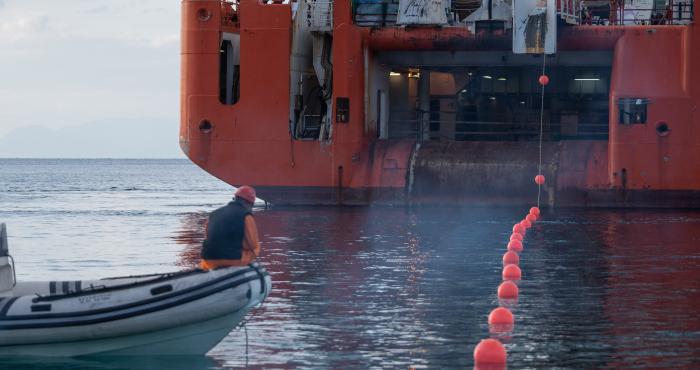The energy ministers of Cyprus and Greece reiterated on Thursday their commitment to work together to bring to fruition the Great Sea Interconnector (GSI), in a move de-escalating the apparent tussle between the two governments over the €1.9 billion project.
Energy Minister George Papanastasiou and his Greek counterpart Stavros Papastavrou held a conference call on the matter with European energy commissioner Dan Jorgensen. Also joining in was Stavros Avgoustidis, Cyprus’ ambassador to Greece – signaling the significance of the call.
In a joint statement later, the two countries’ energy ministries delivered a positive spin.
“During the discussion, stock was taken of all the parameters for implementation of the project, while all the parties reconfirmed their will to press on in a spirit of unity and mutual trust,” the statement read.
A new three-way discussion would take place in the coming weeks, it added.
Earlier, prior to the conference call, Jorgensen told media in Brussels that the Cyprus-Greece interconnector “is indeed a project of great significance for the EU and remains as such”.
The European commissioner added that both he and Ursula von der Leyen, the President of the European Commission, are “very committed” to the project.
The EU has a stake in the project, having pledged €657 million in grants for the GSI, a mooted subsea cable linking the electricity grids of Cyprus and Greece.
Last week a European Commission spokesperson spelled out what Brussels anticipates from the parties – particularly Cyprus.
“We expect all sides to commit to the swiftest possible implementation of the project,” the spokesperson told the Cyprus News Agency.
“Any further delay would be to the detriment of the involved parties…the responsibility lies with the parties to honour their commitments.”
Thursday’s virtual meeting came as differences between the two countries over the project remain unresolved, particularly in light of Cypriot Finance Minister Makis Keravnos accusing Papastavrou of “fake news” over the matter on Monday morning.
The following day, Greek Foreign Minister Giorgos Gerapetritis called for clarity regarding Cyprus’ position on the matter.
“This is because, of course, the national benefits which are produced may be very important, but technical and economic viability is also a necessary condition with regard to European funding,” he said.
As such, he said, “it is not a factor which you can ignore”.
Keravnos’ comments had come after Papastavrou had said that he “does not show” the studies which he claimed demonstrate the project is not sustainable.
In response, he said the studies had been commissioned by Cypriot Energy Minister George Papanastasiou, that they were “properly delivered” to the Greek energy ministry, and that they had even been sent to Papastavrou’s predecessor Theodoros Skylakakis.
“We all know the studies and their findings,” he said, adding that “some people’s concerns are reasonable”, and that he himself has “many concerns”.
Papastavrou last week decried what he described as “constantly conflicting messages from the Cypriot side” over the matter of the interconnector.
The rift between the two governments is sourced from the Cypriot government’s initial agreement to make five annual payments of €25m to Greece’s independent transmission system operator Admie before the interconnector is operational, but which it has thus far withheld.
The payments would in effect help finance the project and ensure that Admie, its 51 per cent shareholder and implementing body, will have a stable income while investing in the project before it turns a profit, but the Cypriot government has cited a lack of tangible progress on the project and differences in opinion regarding how the money should be sourced as its reasons behind not paying the money.
To this end, Papanastasiou had said last month that Cyprus will pay the first €25m instalment when the project is being “implemented in its entirety”, and that the construction of cables alone is “not enough” to meet this criterion.
The Republic of Cyprus had initially planned to utilise funds made available to it through the European Union’s emissions trading system (ETS) to make the payments to prevent the burden of the payments from falling on the taxpayer.
Admie had warned that this arrangement may violate the EU’s rules on state aid, and as such asked the Cyprus energy regulatory authority (Cera) to begin charging consumers instead.







Click here to change your cookie preferences